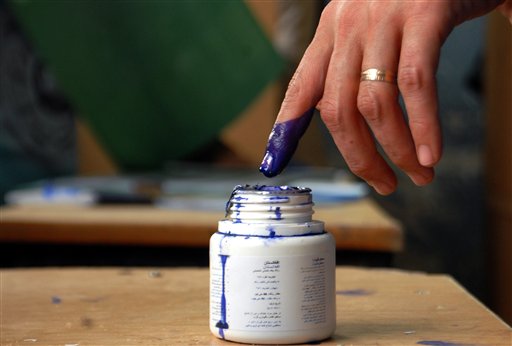BBG Networks Cover Afghan Elections

 As Afghans went to the polls on April 5, the networks of the Broadcasting Board of Governors provided extensive coverage – during the campaigns, throughout Election Day, and immediately after.
As Afghans went to the polls on April 5, the networks of the Broadcasting Board of Governors provided extensive coverage – during the campaigns, throughout Election Day, and immediately after.
Voice of America’s Ashna TV and Radio provided wall-to-wall coverage of the landmark vote, beginning weeks before, when Ashna TV interviewed each of the presidential candidates. The service’s election day coverage included three one-hour, Dari and Pashto language TV specials hosted by anchors in Kabul and Washington, D.C. and exclusive interviews with Farhad Darya, Afghanistan’s biggest pop star and a UN Goodwill Ambassador, on why people should vote; and U.S. Ambassador to Afghanistan, James Cunningham, on the historic importance of the vote and U.S. support for the electoral process.
VOA’s Dari and Pashto websites featured live blogs, videos and social media engagement, and incorporated audience members’ personal experiences as they went to the polls. New visitors to the web site increased by 34% and Ashna Radio’s Facebook page’s reached jumped 400%.
VOA Deewa ran special election broadcasts starting Friday morning and continuing through Sunday (April 4 – 6) engaging Afghans from across the country on the elections via radio, TV, web and social media. On the eve of elections, the Service aired a 55-minute live session with noted poets from Afghanistan and Pakistan who urged Afghans to, “say yes to the ballot and no to bullet.”
VOA’s Urdu Service created a special section on their website with a front page banner for the Afghanistan elections.
Radio Free Europe/Radio Liberty provided important context and background for the election through its popular After Karzai blog, examining among  other issues the significant number of women registering to vote for the first time. Leading up to the election, Radio Free Afghanistan featured a Kabul street art initiative, called “Vote,” which encouraged participation in the election. RFE/RL’s regional director for Afghanistan and Pakistan, Akbar Ayazi, discussed the front-running candidates, the shaky security situation, and the measures put in place to help ensure a free and fair vote. As the polls closed on Election Day, correspondent Frud Bezhan reported from Kabul that the relatively peaceful process had sent a powerful message to the Taliban about Afghans’ desire for democracy.
other issues the significant number of women registering to vote for the first time. Leading up to the election, Radio Free Afghanistan featured a Kabul street art initiative, called “Vote,” which encouraged participation in the election. RFE/RL’s regional director for Afghanistan and Pakistan, Akbar Ayazi, discussed the front-running candidates, the shaky security situation, and the measures put in place to help ensure a free and fair vote. As the polls closed on Election Day, correspondent Frud Bezhan reported from Kabul that the relatively peaceful process had sent a powerful message to the Taliban about Afghans’ desire for democracy.
Radio Azadi contributed comprehensive, exclusive, and detailed coverage of the vote, offering listeners 12 hours of live coverage produced by thirty-three reporters in Kabul and 20 correspondents in the provinces. Coverage included more than 250 live reports, live call-in shows with analysts in the studios in Kabul and Prague and extensive social media engagement. Audience engagement was especially high, through social media and more traditional routes. More than 150 photos submitted by listeners from around the country, and audience members were encouraged to call in to give their voting stories. During the twelve hour broadcast, the service received more than 700 voice messages.
One Afghan official congratulated Radio Azadi for its coverage, “I have no question about any part of the elections. You covered it all.”
